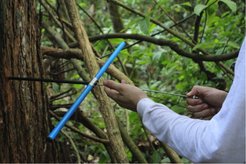Ancient Trees of the Ek Xux Valley, Belize

This project aims to explore the growth patterns and environmental responses of old, large trees in the Bladen Nature Reserve, specifically in the Ek Xux region of Belize. This area is characterized by its rich biodiversity and significant cultural history, making it an ideal locale for studying the intricate interactions between forest ecosystems and past human activities. The project is part of the larger BLADEN initiative, based at the University of Exeter, which investigates biodiversity dynamics against the backdrop of anthropogenic disturbances. By coupling ancient and modern biodiversity proxies, the BLADEN project integrates archaeology, palaeoecology, botany, plant genomics, and remote sensing to generate unprecedented datasets on vegetation responses to human activity, spanning from initial human colonization in the Late Pleistocene through the rise and collapse of the Classic Period Maya to the present day after 1,000 years of natural forest regeneration.

Using dendrochronological techniques alongside radiocarbon dating, this study seeks to create high-resolution, annual datasets that reveal environmental changes over the lifespan of these trees. These insights will contribute to a deeper understanding of historical climatic conditions and the anthropogenic impacts that have shaped the forest landscape over time. The project's primary focus will be on identifying and sampling trees of considerable age and ecological importance. By extracting tree core samples, the research will evaluate how fluctuations in environmental conditions, particularly rainfall and temperature variations, have directed tree growth across different historical periods. The project will also assess the effects of local disturbances, including human activities and natural events, on recruitment patterns and overall tree health. This comprehensive approach provides insights that could influence future conservation strategies and enhance understanding of the complex relationships between ecological factors and human management practices.
Ultimately, the anticipated outcomes include a rich dataset elucidating the relationships between tree growth, environmental variability, and human-induced disturbances in the Ek Xux region. The findings will contribute to ongoing discussions in conservation and forest management, underscoring the significance of integrating Indigenous ecological knowledge into modern practices. This aligns with the core theme of "Land Use Change and Regenerative Practices" and “The Anthropocene Biosphere” at the Max Planck Institute of Geoanthropology, advocating for sustainable management practices that honour both environmental integrity and cultural heritage.












